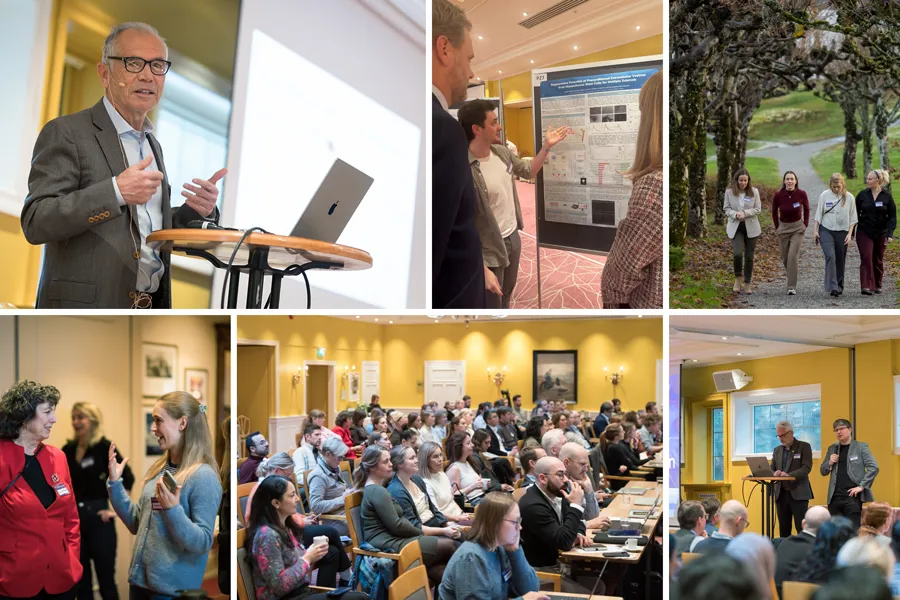Two Days of Science and Synergy: Neuro-SysMed Symposium Wrap-Up
On Wednesday, November 19, 2025, Neuro-SysMed concluded its Annual Symposium 2025 after two inspiring days filled with cutting-edge science, collaboration, networking, and lively discussions. With over 150 dedicated participants, the event showcased the latest advances in neurological research and set the stage for future breakthroughs.

Photo: Neuro-SysMed, Eivind Senneset, Agnete Engelsen
The symposium was preceded by a full day of meetings for the EBV-MS consortium (led by Neuro-SysMed) and dementia research teams together with patient organizations. The EBV-MS project is a major EU-funded research initiative focused on understanding the role of Epstein-Barr virus (EBV) in multiple sclerosis. These meetings underscored the importance of international collaboration in tackling complex neurological diseases.
Day 1: Moving Closer to Prevention
The first day of the Neuro-SysMed Symposium highlighted the remarkable strides toward disease prevention. In multiple sclerosis (MS), what once seemed impossible now feels closer than ever. Christian Münz (Zürich), Gavin Giovannoni (London), and Fredrik Piehl (Stockholm) gave intriguing talks highlighting different aspects of this. This is a development that is being closely followed by researchers in all other neurodegenerative diseases with great interest.
Alberto Ascherio (Boston), Arcadi Navarro Cuartiellas (Barcelona), and Johannes J. Gaare (Bergen) followed up with perspectives on prevention beyond MS. Ascherio emphasized the urgent need for rigorous longitudinal studies to clarify the role of viral infections in Alzheimer’s disease and to pave the way for preventive interventions. Navarro highlighted integrated strategies for lifelong brain health, early detection, and personalized prevention, while Gaare brought insights from Neuro-SysMed’s NOR-RBD study that aims to develop biomarkers for prediction and risk stratification regarding future disease development.
The day ended on an exciting note with breaking news from other Neuro-SysMed studies. Of special note was the positive results presented by Øivind Torkildsen from the large Phase 2/3 study “OVERLORD-MS”, marking a significant milestone in MS research.
Day 2: Collaboration and Innovation in Trial Design
The second day focused on collaboration across platform studies spanning multiple sclerosis, Parkinson’s disease, ALS, and dementia, demonstrating how shared approaches can accelerate progress. We also explored innovative trial designs that promise to transform the way clinical research is conducted.
The UK examples provided compelling models for how we can change the way we approach clinical research:
Suvankar Pal (Edinburgh) presented MND-SMART, an adaptive trial design for motor neuron disease that accelerates testing of multiple treatments while integrating biomarker-driven insights and patient co-production. Thomas Foltynie (London) and Camille Carroll (Newcastle) introduced EJS ACT-PD, a UK-wide Parkinson’s platform trial enabling remote participation and efficient evaluation of disease-modifying therapies. Paresh Malhotra (London) outlined plans for AD-SMART, a sustainable platform for Alzheimer’s disease that prioritizes promising compounds and incorporates digital outcomes and patient involvement to transform trial delivery. Jeremy Chataway (London) presented the OCTOPUS trial, a pioneering multi-arm, multi-stage platform study in progressive MS designed to efficiently test repurposed treatments like metformin and alpha-lipoic acid, setting a new standard for trial design in this challenging disease stage.
Xavier Montalban (Barcelona) gave a forward-looking perspective on what constitutes the “ideal trial design” in the era of high-efficacy MS therapies.
Neuro-SysMed followed up with Charalampos Tzoulis’ presentation of the SLEIPNIR and HYDRA platform initiatives for PD, creating an integrated pipeline from mechanistic rationale to late-stage efficacy within a harmonized national infrastructure. Marcus Werner Koch (Calgary) discussed the use of Simon Two-Stage futility trial designs to accelerate phase 2 testing in progressive MS, Alzheimer’s, and Parkinson’s disease, offering a cost-effective way to screen promising treatments and improve trial efficiency.
Poster Session and Awards
Our poster session featured 29 scientific posters, reflecting the breadth and depth of ongoing research. The audience voted Julia Saltyte Benth as the winner of the Best Poster Award for her work titled “Parkinson’s disease enhances sex differences in semantic fluency and processing speed.” The committee-selected Best Poster Award went to Casper Sandvik for his poster “Characterization and Regenerative Properties of Small Extracellular Vesicles from Transdifferentiated Mesenchymal Stem Cells in Multiple Sclerosis.” Congratulations to both winners and to all presenters for their outstanding contributions!
We extend our heartfelt thanks to all participants, speakers, and poster presenters for making this symposium a success. Your dedication and engagement were inspiring and reaffirm the strength of our shared commitment to advancing neurological research and improving patient care.
Director’s Comment
The Director of Neuro-SysMed, Professor Charalampos (Haris) Tzoulis, finds the symposium to have been a smashing success.
“Two days of invigorating science and inspiring discussions and new collaborations - exactly what a science meeting should be about. We are immensely grateful to all speakers - local and international - and our colleagues who made sure the meeting ran smoothly,” says Haris.